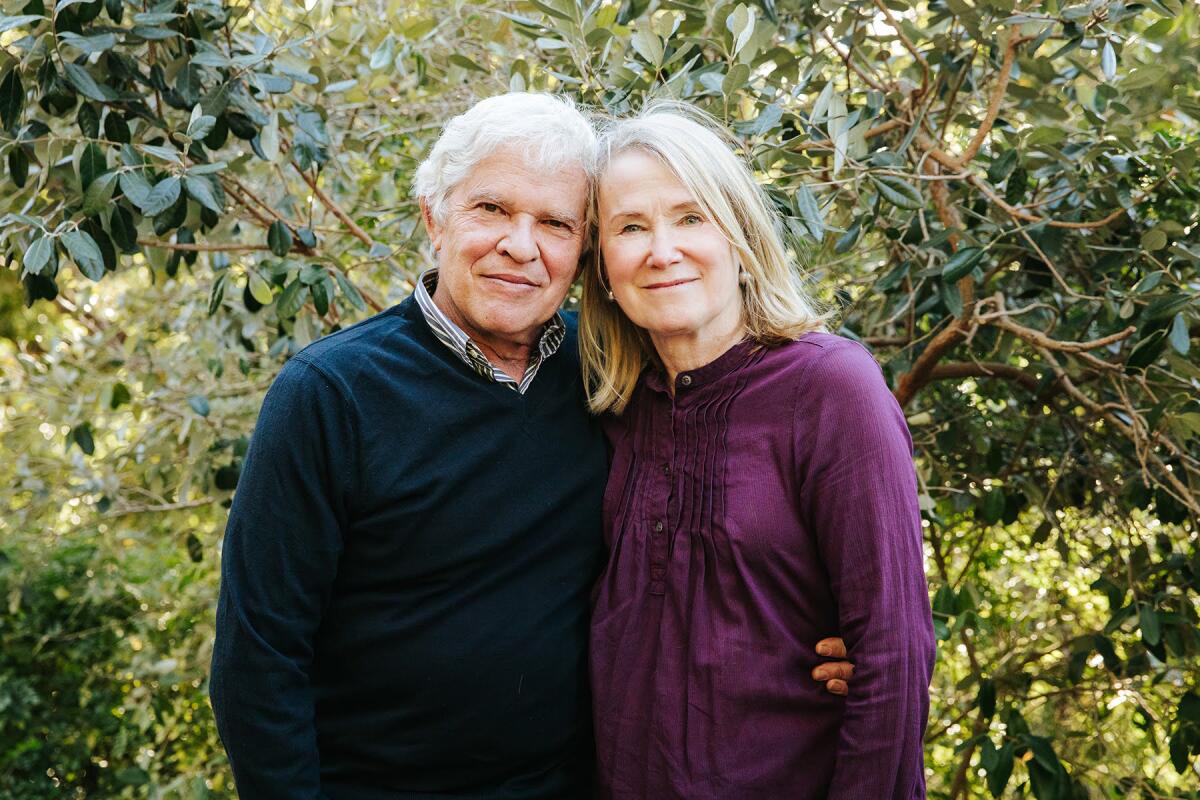David Lehrer, civil rights lawyer and longtime L.A. Jewish leader, dies at 75

- Share via
David A. Lehrer, a longtime leader in Los Angeles’ Jewish community and attorney who helped draft the state’s hate crime laws, has died. He was 75.
He collapsed Wednesday at his Los Feliz home and could not be revived, his family said in a statement.
Lehrer worked for almost 30 years in the West Coast office of the Anti-Defamation League, joining the ADL in 1975 as a civil rights attorney and later being promoted to regional director.
He also led legislative efforts to outlaw tax-subsidized discrimination at private social clubs, including the Jonathan Club, and confronted neo-Nazi and other extremist groups in the West.
Lehrer, a lifelong resident of Los Feliz, was an active longtime member of Temple Israel of Hollywood “and will be greatly missed by all who knew, worked with and loved him,” his family said.
Lehrer was a first-generation Angeleno, born to parents who fled Europe to escape antisemitism.
His mother, Gertrude “Trudy” Lehrer, escaped Vienna in 1938 just after Kristallnacht, or “the Night of Broken Glass,” when Nazis burned synagogues, destroyed Jewish businesses and homes and killed Jewish people in Germany and Austria.
From a Times Staff Writer Los Angeles attorney Amanda Susskind has been named director of the Anti-Defamation League’s Los Angeles regional office, officials said Thursday.
“Had she not gotten the visa for the United States, undoubtedly she would have perished in Austria and [in] the concentration camp,” Lehrer said in a tribute video for his mother’s 100th birthday.
Lehrer died a year after his mother, who was a week shy of her 103rd birthday when she died in the same home, his family said.
He was born Oct. 12, 1948, to Trudy and Irving Abraham Lehrer. He decided he wanted to be an attorney around 13, when he read “My Life in Court,” a 1961 memoir by trial attorney Louis Nizer.
“He never changed his mind — he just wanted to be a lawyer,” his younger brother, Michael, said Friday.
After graduating from UCLA School of Law in 1973, Lehrer joined a private firm where, a few years into it, he realized he was unhappy, his brother said.
“He realized, ‘Why am I spending my time working to defend people and things I don’t really care about?’” Michael said.
As an attorney at ADL, Lehrer appealed to the California Coastal Commission in 1985 to decline the request of the Jonathan Club — which leased 58,000 square feet of public land for its beachfront location — to improve its Santa Monica property unless the club enforced a nondiscrimination policy.
After a three-year legal battle, the U.S. Supreme Court upheld the state court’s decision, which had agreed the coastal panel was within its purview to demand the club enforce such a policy. The decision affected other wealthy social clubs around Los Angeles with a history of accepting only white Christian men.
“It’s a part of the process of eliminating this last vestige of institutional bigotry, the country club and the downtown club, that are small enclaves of discrimination,” Lehrer told The Times in 1988.
Longtime Times columnist Al Martinez wrote during the case that he’d known Lehrer many years and observed his fervent dedication to civil rights.
“He can identify an antisemite in a room full of liberals while blindfolded, picking the racist out by only his vibrations, like a tiger shark selects its next meal,” Martinez wrote in 1985.
In 1998, Lehrer was one of the first Jewish leaders to work with Muslim leaders and developed a code of ethics with them in 1998 to promote civil debate.
After 27 years with the ADL, Lehrer was fired in 2001, a controversial move by the organization’s New York leadership — with whom Lehrer had political and personal disagreements — that was decried by many faith leaders in L.A., The Times reported. (He, privately and recently, made up with the man who fired him, his family said.)
“Probably he is paying the price for the more balanced view he took toward Muslims,” Aslam Abdullah, vice president of the Muslim Public Affairs Council, said at the time.
Lehrer bounced back quickly, working with community activist Joe Hicks to form Community Advocates, a nonprofit focused on race and human relations. The organization published articles, led programs and helped develop educational curricula aimed at promoting tolerance, his family said in a statement.
In 2017, Lehrer was alarmed by the rhetoric of President Trump and his travel ban on Muslim-majority countries, and also disappointed that the Jewish community wasn’t raising its voice against the Trump administration’s outrageous policies, said former county Supervisor Zev Yaroslavsky, who knew Lehrer for 50 years.
It appeared to be business as usual Saturday at the Jonathan Club despite a California Coastal Commission decision that could force the club to adopt a nondiscrimination policy if it wants to expand its facilities.
Lehrer, Yaroslavsky and other prominent Jewish leaders launched Jews United for Democracy and Justice, an organization focused on protecting the country’s constitutional democracy.
The group produced “America at a Crossroads,” a weekly online discussion hosting prominent experts and L.A. journalists.
On Thursday, attorney and longtime activist Janice Kamenir-Reznik, his co-host, opened the show in honor of Lehrer.
Kamenir-Reznik said more than 1,000 viewers emailed her after hearing of Lehrer’s death, noting that many told her that although they’d never met him, they felt as if they’d lost a beloved friend.
“David was a magnificent tapestry of the most positive human characteristics,” Kamenir-Reznik said. “He was soft yet tough, bold yet humble, always ready to speak truth to power, to call out injustice and false information, and he was wise beyond measure.”
Lehrer was aware of the enormous threats to the U.S. Constitution and democracy — but unwilling to yield to despair about the future, she said.
Before every program, he asked moderators and guests to try to end each program with at least a drop of hope and optimism.
“Because he couldn’t bear leaving you, our audience, depressed and hopeless,” Kamenir-Reznik said.
In addition to his brother, Lehrer is survived by his wife, Ariella; his children Eli, Jonah, Rachel and Leah; a sister, Shelah; and nine grandchildren.
More to Read
Sign up for Essential California
The most important California stories and recommendations in your inbox every morning.
You may occasionally receive promotional content from the Los Angeles Times.














